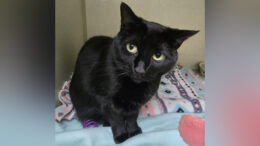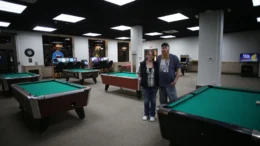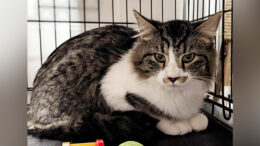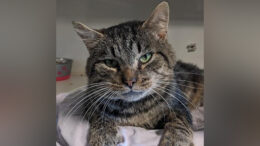By RILEY YATES and PAMELA LEHMAN
The (Allentown) Morning Call
ALLENTOWN, Pa. (AP) — Travis Mohr found sobriety after heroin came close to taking his life. Every year at the anniversary of the day he got clean, his parents hosted a celebration at their Whitehall Township home to recognize another 12 months of having their son back.
But last year as his fourth year in recovery neared, Mohr told them that he wasn’t sure he wanted another party. Four days after that milestone passed, his father found the 27-year-old dead in his room from heroin.
Twice, Darlene Lewis of Northampton has had her heart broken by the drug. Her 30-year-old son killed himself by jumping off a bridge while struggling to kick his addiction. Less than a year later, her younger daughter overdosed at 27 in Allentown.
It’s no secret that Pennsylvania and the rest of the nation are in the throes of a heroin epidemic, fueled by cheap and easy access to the drug. Few feel the pain as much as the parents of overdose victims who tried and failed to rescue their children. Four of those families shared their stories with The Morning Call in the hope their reflections would help others.
Though each account was different in its details, the overall narratives were depressingly similar, and offer insight into the steep descent heroin addicts experience — and the heavy toll it takes on their families.
The parents still struggle to understand how their children, who started as kids who had promise, became so drug dependent that they would lie and steal to get a fix. Petty crime and rehab were typical, and some ended up homeless or in prison. To save their children, the parents swung from tough love to coddling and lived in dread of that phone call in the middle of the night.
Then, one day, their greatest fears were realized.
“There’s no getting through it. There’s no getting over it,” said Barbara J. Matott, whose 22-year-old daughter, Jaclyn, died in 2014 of an overdose in Easton. “You just learn to try to incorporate it and figure out who you are.”
“She was everything to me,” Matott said of her only child. “Who am I now?”
The numbers have to be brought down, said Carolyn L. McRae, whose son James McRae overdosed in Easton at 44 years old.
A longtime heroin addict, James McRae lost both of his legs and one of his arms to an infection five years before he died. Yet it still wasn’t enough to break him from the drugs that killed him in 2014.
“The times that we’re living in,” his mother mused, “people need to be more aware and pay more attention, so that we can save as many as we can.”
JAMES McRAE
James McRae was one of five children of Carolyn and her husband, the late Rev. Clyde R. McRae, a well-known minister, West Ward community leader and former president of the local chapter of the NAACP. More than two decades later, Carolyn McRae still remembers how her husband was floored when their son first admitted his addiction to them.
“He wasn’t mean. He wasn’t a vicious type of person,” she said of James. “I don’t believe he wanted to wake up every morning and know he needed a fix.”
Carolyn McRae, 69, remembers her son as a fun and lovable man of faith who always charmed congregants at their church. The family never tried to hide his addiction from others and believed it helped them better understand the struggles sometimes faced in their community, she said.
Once when she was volunteering at Easton’s Safe Harbor homeless shelter, James saw her and waved, beaming and happy to see her, though he was staying there at the time.
“We weren’t ashamed of him. Everybody knew,” the mother said. “Maybe we were ashamed of some of the things he did.”
James was a convict and carried a criminal record that included theft and drug offenses and a three-year stint in state prison for stabbing his then wife in the leg in 2003 during an argument. After his release, he was the victim of an assault that nearly killed him, his mother said, when he was stabbed in the heart while riding the El train in Philadelphia.
The scare gave the family hope that James would finally beat his demons.
“I just knew if anybody can live through that, he’s a changed man,” Carolyn McRae said. “So we brought him home and, unfortunately, he started using again.”
Racked by congestive heart failure, James’ health only got worse. It was an attack of bilateral pneumonia in 2009 that left her son a triple amputee, Carolyn McRae said. By the time he was hospitalized with the lung infection, she said, her son’s body had already begun to shut down, and the doctors warned he might not survive the night.
“He was getting high so he didn’t realize how sick he was,” she said. “He was high and he didn’t pay attention.”
James lost his legs from the knee down and his left arm from near the elbow. His mother said he could no longer shoot up drugs, but continued to feed his addiction through prescription pills.
“Of course he abused them,” she said. “If he didn’t, he wouldn’t be dead.”
James overdosed on Aug. 21, 2014, from a five-drug combination that included morphine and oxycodone, another opiate, according to a coroner’s record. A friend who was staying at his Elm Street apartment found him lifeless upon returning from the food bank, where he had gone to get James supplies, said a police report obtained through a right-to-know request.
Carolyn McRae said she had known her son’s days were drawing to a close. The last time they saw each other, he had come by her house on a scooter he used to get around. He’d just finished a stint at the hospital and looked unhealthy and wasn’t breathing right, she said.
“There were times you didn’t know what to do, you would become so frustrated,” she said. “Before he died, I cried for a week, because I knew it was ending.”
TRAVIS MOHR
Travis Mohr seemed to be doing so well, especially considering where heroin had once taken him.
At 27, he was off drugs. Four years earlier, his parents believed he had, thankfully, hit his rock bottom. He agreed to go to a rehab in Philadelphia, then spent a month at a sober living house in San Diego.
Donald and Cynthia Mohr traced Travis’ start with drugs to his school years, before he graduated from Whitehall High School. He fell while skateboarding and was prescribed painkillers after doctors discovered he had a degenerative spine. Eventually, he was stealing medications from his mother, who suffers from debilitating back problems.
“Percocet, he took that,” Cynthia Mohr said. “Opiates, OxyContin, he took that.”
It hadn’t been easy before he got clean. His mother’s jewelry went missing. Some rare coins. A few of his father’s tools. A bicycle.
Later, when he was sober, Travis was driving with his father when they passed a hitchhiker on the road.
“He said, ‘Back in the day, I’d pick him up, and I’d beat the crap out of him and take his money,'” recalled Donald Mohr, 69.
Travis had overdoses that he survived. In one, his mother found him unresponsive in his room. He was without oxygen so long he suffered brain damage that ruined his short-term memory.
He’d also been hospitalized for a bacterial infection he’d caught from shooting up after he contracted MRSA in both of his arms. The contagion was spreading to his chest, and doctors said that if it hadn’t been caught, Travis might have died.
His son at last decided he wanted to change. And he did so, attending support groups for drug addicts after rehab and becoming an active spokesman on the dangers of heroin.
Six months into recovery, Travis had a relapse in which he overdosed again. Afterward, Donald Mohr remembered taking his son to 90 Narcotics Anonymous meetings in 90 days.
“He used to come home and he’d say, ‘Dad, one month.’ ‘One month, one day.’ ‘Two months,’ ” the father said. “He was very proud of that.”
The message took hold. They got their son back. Slowly, he started to work again, and to get better jobs. He began speaking at rehabs and jails about his struggle to recover. He became the one making sure others made it to their support group meetings.
“He was clean. He was happy. Everything was going good,” Donald Mohr said.
The Mohrs said they aren’t sure when their son relapsed. Sometime between his third and fourth year of sobriety. He’d gotten work at night at a factory, which kept him from meetings, they said. Apparently, he’d gotten back in with drug users.
July 4 came and went last year without the pool party the parents usually hosted on their son’s sober date. Looking back, it was one of a couple of signs that Donald Mohr said he now questions himself for not catching.
On July 8, Travis died. His funeral drew more than 300 people, his mother said. Since his death, they’ve received letters from other parents thanking Travis for helping spur their kids into recovery.
It’s the only silver lining, the parents said — that their son was able, if far too briefly, to beat his addiction and reach others.
“The one thing we have is the four years of being clean, which I understand a lot of people don’t get,” Donald Mohr said. “That to me is just a gift.”
JACLYN MATOTT
Jaclyn Matott told her mother about her addiction in early 2013 just after her 21st birthday, when she confessed she was broke, though Barbara Matott had recently given her more than $700.
The money? It all went to heroin, her daughter said.
“It’s just a shock,” said Barbara Matott, 46, of Belvidere, N.J. “You’re numb. You don’t know what to say. You’re screaming. You’re yelling. You’re crying. You don’t know what to do.”
Less than two years later, Jaclyn overdosed.
Barbara Matott, a single mother, said she tried to do right by her daughter, her only child, who loved animals, Disney movies, laughing and having fun. A typical kid.
She said she never worried about heroin. During her daughter’s freshman and sophomore years, she caught the teen with vodka, or a bag of marijuana, but thought she was only experimenting as many youths do.
How it went from there to heroin, Barbara Matott said she cannot understand. But looking back, she remembers Jaclyn being prescribed painkillers after getting a cut to her leg that didn’t seem to heal.
Her daughter would joke about how much money she could get selling the pills at school. At the time, Barbara Matott thought the teen was just testing her. Now she wonders whether Jaclyn was using them recreationally.
Even after admitting her addiction at 21, her daughter insisted it was under control, Barbara Matott said.
“Mom, it’s not that big of a deal,” she remembered her saying. “I’m going to stop.”
But she never could.
In the less than two years that remained, Jaclyn went to rehabs on the Jersey shore and in Palm Beach County, Fla. Her mother, a customer service representative, struggled with insurance and her limited finances to get her daughter help, though it always proved inadequate.
Jaclyn couldn’t stay sober.
During the course of her addiction, she got a MRSA infection that hospitalized her for over a month. When she was home, she stole from her mother, including the wedding band that Barbara Matott’s fiance had given her. When she was elsewhere, she’d call asking for money, telling her mother hard-luck tales — an empty gas tank, a friend in need — and asking her to send the funds by Western Union.
“The stories that they could come up with, I look back now and I think how could I be so stupid?” the mother said. “But I just think I was stupid. I just wanted it to be true.”
Throughout it all, Barbara Matott said, she hoped her daughter would manage to see the light and decide her life had to change. But no matter what her mother tried, Jaclyn couldn’t.
“Tough love to enabling, back to tough love, to enabling,” Barbara Matott said of her efforts. “It’s crazy. You lose your mind. It’s not just the addict who loses their mind. It’s everybody associated. It’s like shrapnel.”
The last time she saw her daughter was on Oct. 19, 2014, when Jaclyn came to Barbara’s home in Belvidere. She seemed happy.
She was found unresponsive Oct. 21, 2014, at a home on West Berwick Street on Easton’s South Side. Her mother was driving to work when she got the phone call from authorities.
Since her daughter’s death, friends have told her that she did everything she could to save her.
“But it doesn’t matter,” Barbara Matott said, “because I don’t think I did.”
DUSTIN LEWIS
Dustin Lewis had struggled with drugs since his teens.
Though his addiction was curbed in August 2014 by the heroin substitute Suboxone, his problems continued. He couldn’t find a job to support his family. He was angry with himself that his daughter had to watch him cycle in and out of jail and rehab. It had all taken a toll on his parents, whom he had stolen from to support his habit.
One day, Dustin told his mother that God had given him a choice he had to quickly make. Darlene Lewis tried to soothe her 30-year-old son, telling him God didn’t expect him to act rashly. They prayed over it.
At their home in Northampton, Darlene Lewis kept a religious-themed daily calendar, and the next morning, her son flipped the date as he always did. The message on Aug. 13, 2014, showed a floating angel and the words, “No river is too wide for an angel to help you cross.”
Dustin left the house that day with only a small cross in his pocket. His daughter’s mother saw him walking across the Coplay-Northampton bridge on her way to work and tooted her horn at him as he casually waved back.
A witness later told Darlene Lewis that her son walked without hesitation to the middle of the bridge and climbed over the railing. He jumped, his body recovered the next afternoon by rescue personnel scouring the river.
“I know people think a suicide is a selfish act, but Dustin felt like he was a burden,” said Darlene Lewis, 58. “I think he felt like God wanted to take him home.”
AMBER LEWIS
Amber Lewis wasn’t much longer for the world. Eleven months after her brother Dustin’s death, Amber overdosed on July 6 in the locked bedroom of an Allentown home, where she was discovered with several bags of heroin and a needle.
Darlene Lewis and her husband are now caring for Amber’s children, 3-year-old Madison, who was born addicted to heroin, and 6-year-old Gabriel. For the first few weeks of her life, Madison thrashed and shook in the ICU as she was slowly weaned off the drug.
During a recent interview, Darlene Lewis cradled and kissed a giggling Madison, and sighed as she looked at a pile of mounting bills from Amber’s and Dustin’s funerals. Her home includes a corner shrine to her children where she keeps cherished photos, Dustin’s ball cap and Amber’s favorite sunglasses.
“I never thought I’d be burying my children,” she said.
She hopes the next generation will avoid that fate. At the funerals, she said, she took her grandchildren to the caskets to show them what heroin does.
Darlene Lewis said she still wasn’t sure how her daughter had been drawn to heroin and hadn’t realized how badly she had fallen into her addiction. Even as Amber watched her brother degrade from his drug use and said how much she hated it, she was lured by heroin.
In the days before her daughter’s death, Darlene Lewis couldn’t trust her to stay in her home. Their limited conversations were about the children.
“I didn’t want to get pulled into the drama of her using,” she said.
They had to break down the bedroom door to find Amber, 27, unresponsive and cold. She’d gotten kicked out of yet another rehab and had sought shelter with a relative in Allentown.
For her funeral, the family displayed poster boards with pictures of her in happier times. Recently, Darlene Lewis tried to pack those posters away, but Madison became upset, so they were left out for her to see.
In the family’s dining room, Madison pulled up a step stool to touch those images.
“Mommy, mommy,” Madison called out as she leaned forward to kiss a photo of herself and her mother sticking out their tongues.
Darlene Lewis said she wants her grandchildren — and anyone else it may help — to understand what happened to her children and to know it was preventable.
“If I can save just one person by telling their stories, then it’s worth it,” Darlene Lewis said. “I’m not staying silent.”































